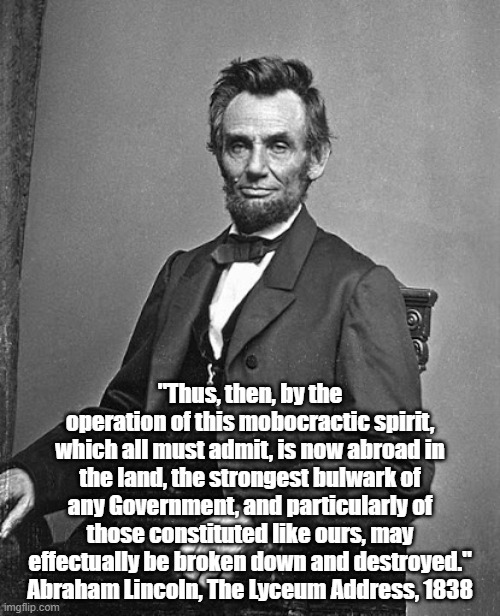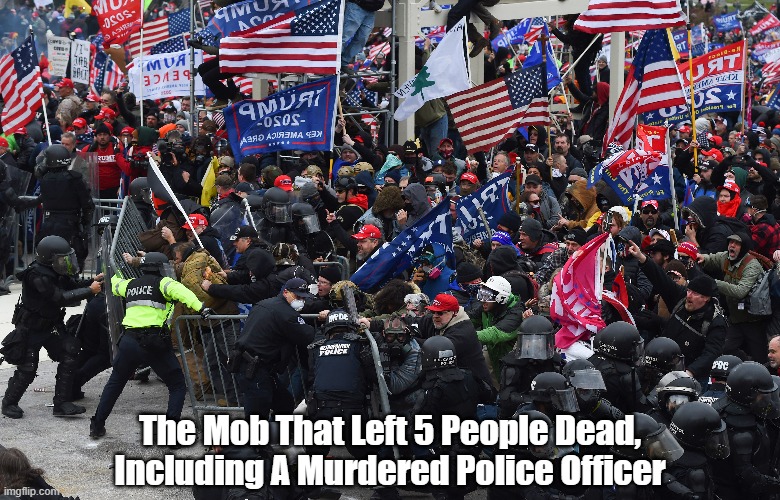Excerpt: At what point shall we expect the approach of danger? By what means shall we fortify against it?-- Shall we expect some transatlantic military giant, to step the Ocean, and crush us at a blow? Never!--All the armies of Europe, Asia and Africa combined, with all the treasure of the earth (our own excepted) in their military chest; with a Buonaparte for a commander, could not by force, take a drink from the Ohio, or make a track on the Blue Ridge, in a trial of a thousand years.
At what point then is the approach of danger to be expected? I answer, if it ever reach us, it must spring up amongst us. It cannot come from abroad. If destruction be our lot, we must ourselves be its author and finisher. As a nation of freemen, we must live through all time, or die by suicide...
... Turn, then, to that horror-striking scene at St. Louis. A single victim was only sacrificed there. His story is very short; and is, perhaps, the most highly tragic, if anything of its length, that has ever been witnessed in real life. A mulatto man, by the name of McIntosh, was seized in the street, dragged to the suburbs of the city, chained to a tree, and actually burned to death; and all within a single hour from the time he had been a freeman, attending to his own business, and at peace with the world.
Such are the effects of mob law; and such as the scenes, becoming more and more frequent in this land so lately famed for love of law and order; and the stories of which, have even now grown too familiar, to attract any thing more, than an idle remark.
But you are, perhaps, ready to ask, "What has this to do with the perpetuation of our political institutions?" I answer, it has much to do with it. Its direct consequences are, comparatively speaking, but a small evil; and much of its danger consists, in the proneness of our minds, to regard its direct, as its only consequences. Abstractly considered, the hanging of the gamblers at Vicksburg, was of but little consequence. They constitute a portion of population, that is worse than useless in any community; and their death, if no pernicious example be set by it, is never matter of reasonable regret with any one. If they were annually swept, from the stage of existence, by the plague or small pox, honest men would, perhaps, be much profited, by the operation.
Similar too, is the correct reasoning, in regard to the burning of the negro at St. Louis. He had forfeited his life, by the perpetration of an outrageous murder, upon one of the most worthy and respectable citizens of the city; and had not he died as he did, he must have died by the sentence of the law, in a very short time afterwards. As to him alone, it was as well the way it was, as it could otherwise have been.
But the example in either case, was fearful.
When men take it in their heads to day, to hang gamblers, or burn murderers, they should recollect, that, in the confusion usually attending such transactions, they will be as likely to hang or burn some one who is neither a gambler nor a murderer as one who is; and that, acting upon the example they set, the mob of to-morrow, may, and probably will, hang or burn some of them by the very same mistake. And not only so; the innocent, those who have ever set their faces against violations of law in every shape, alike with the guilty, fall victims to the ravages of mob law; and thus it goes on, step by step, till all the walls erected for the defense of the persons and property of individuals, are trodden down, and disregarded. But all this even, is not the full extent of the evil.
By such examples, by instances of the perpetrators of such acts going unpunished, the lawless in spirit, are encouraged to become lawless in practice; and having been used to no restraint, but dread of punishment, they thus become, absolutely unrestrained.
Having ever regarded Government as their deadliest bane, they make a jubilee of the suspension of its operations; and pray for nothing so much, as its total annihilation. While, on the other hand, good men, men who love tranquility, who desire to abide by the laws, and enjoy their benefits, who would gladly spill their blood in the defense of their country; seeing their property destroyed; their families insulted, and their lives endangered; their persons injured; and seeing nothing in prospect that forebodes a change for the better; become tired of, and disgusted with, a Government that offers them no protection; and are not much averse to a change in which they imagine they have nothing to lose. Thus, then, by the operation of this mobocractic spirit, which all must admit, is now abroad in the land, the strongest bulwark of any Government, and particularly of those constituted like ours, may effectually be broken down and destroyed--I mean the attachment of the People. Whenever this effect shall be produced among us; whenever the vicious portion of population shall be permitted to gather in bands of hundreds and thousands, and burn churches, ravage and rob provision-stores, throw printing presses into rivers, shoot editors, and hang and burn obnoxious persons at pleasure, and with impunity; depend on it, this Government cannot last.
"Thus, then, by the operation of this mobocractic spirit, which all must admit, is now abroad in the land, the strongest bulwark of any Government, and particularly of those constituted like ours, may effectually be broken down and destroyed?" Abraham Lincoln, The Lyceum Address, 1838
Capitol Police Officers' Stunning Testimony Before The House Select Committee's Investigation Of The January 6th Insurrection Whivh Was Fueled By Donald Trump. (All 3 hours 32 minutes)
"American Insurrection," A New Documentary By PBS-Frontline (Streams Freely Online)
https://newsfrombarbaria.








No comments:
Post a Comment